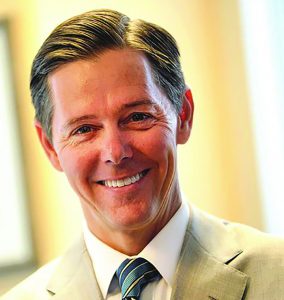At the 1989 inauguration of President George H.W. Bush, Ralph Reed struck up a conversation with Pat Robertson, who was in the process of organizing what would become the Christian Coalition of America. He asked Reed to come work with him.
Reed declined, intending to pursue a career as a history professor.
But only months later, Robertson invited him to a planning meeting and Reed was sucked in. He was appointed executive director of what was then called the Christian Coalition, and quickly became a public figure. Reed said it would have been difficult to go back from there, and so that was the launch of his political career.
At 2 p.m. July 14 in the Hall of Philosophy, Reed will give a lecture titled “The Duty of Faith and Citizenship” as part of this week’s theme “Moral Leadership in Action.” Reed is known for his involvement with the Christian Coalition of America, working on former President George W. Bush’s campaign and founding the Faith and Freedom Coalition.
In his lecture, he will argue that people of the Christian faith have a “dual citizenship” of being an American and Christian, and how they can best take action that fulfills that responsibility.
While an undergraduate history student at the University of Georgia in 1979, Reed was elected as chairman of the College Republicans, and became a leader for student support of Ronald Reagan’s campaign for president in 1980. That sparked his interest in politics, which led him to work as executive director of the Christian Coalition after receiving his Ph.D. in history from Emory University.
Reed’s dedication to the coalition was motivated by his Christian values, but his spiritual interests actually developed at the same time as his political views.
Reed grew up attending a Methodist church, but said during his early life “it was more of a church-ianity than a Christianity.” He didn’t have a personal relationship with Jesus and drifted away from his faith as he became more involved in politics during college.
But in September 1983, Reed again became interested in spirituality. He decided to look up a church in the yellow pages and attend a service. That service instigated an unexpected “profound faith experience” that caused Reed to make a lifelong commitment to Christ.
“After thinking about it I decided I was going to go to church, [although] I hadn’t been to church in some years other than at Christmas or Easter,” Reed said. “I had no intention of making any kind of a spiritual decision of that magnitude myself, but when the pastor preached the sermon that morning and did an altar call I felt a pang of conscience and I felt called.”
Reed went on to work on several political campaigns, including those of President George W. Bush. Reed felt motivated in this work because he felt electing Bush would help pass policies he supported.
“I decided that I wanted to make a difference, hopefully identify a candidate and get him elected, because I felt like a lot of things we were trying to achieve as conservatives and as Christians we’re not going to be achieved unless we had somebody in the White House who shared our views and our values,” Reed said. “Then it was just serendipitous and really a great blessing and a privilege that that person ended up being George W. Bush, someone who I consider a friend, somebody who I had and have a lot of respect for, and who I am very proud to have helped in his campaign.”
Reed eventually founded the Faith and Freedom Coalition, an organization that works to contact Christians in the U.S. and both educate and mobilize them to take action supporting conservative public policy and legislative issues.
“It’s not always been easy. It’s been hard building an organization like this,” Reed said. “But I’m really glad that I went ahead and made that decision because I think Faith and Freedom Coalition and organizations like it are desperately needed to sort of counterbalance a lot of the special interests that are out there in the state capitals or in Washington influencing public policy.”




